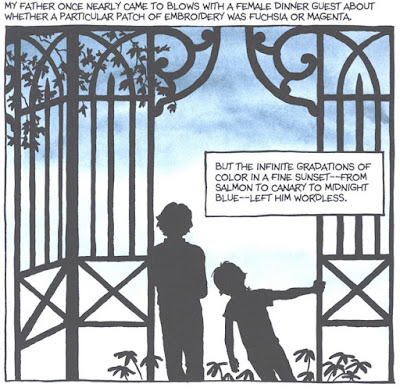I’ve been interested in the ways that Alison Bechdel uses
nature in Fun Home, particularly in
connection with some of the ideas that Hillary Chute raises about triangulation
and the ways words and images work together in comics to more accurately
represent truth.
Bechdel writes, “I have suggested that my father killed
himself, but it’s just as accurate to say that he died gardening.” She then
describes her father’s love of trees and flowers, and how this seemed suspect
to her as a child, indicative of a lack of masculinity in her family that
influenced her own gravitation toward strength and toughness. On the one hand,
Bechdel’s father’s interest in landscaping is another example of his interest
in cultivating a particular kind of household façade, while on the other it is,
from young Bechdel’s perspective, a clue to her father’s secret identity and a
danger to her family’s integrity, as well as an influence on her own identity.
Bechdel later describes the summer of her father’s trial,
using the cicadas and the trees felled by the storm as physical manifestations
of the unrest and unease of that time. She links the overwhelming sexuality of
the cicadas to her developing body, and wonders “whether or not my hormonal
fluctuations were the cause” of the “chaos” in the household that summer. The
suggestion that Bechdel’s physical changes might have somehow contributed to
the issues with her father is interesting, and reflects a complex perspective
on the ways that family influences identity. Just as Bechdel adopts more
masculine habits in response to perceived feminine weakness in her father, she
suggests that he, too, may be influenced by her own sexuality and perceptions
of gender.
Similarly, Bechdel’s experience with the snake while on the
camping trip raises questions about the extent to which identity is inherent
and the degree to which it is shaped in relation to one’s family and
environment. When confronted with the nude calendar, Bechdel rejects its
explicit portrayal of femininity and asks her brother to call her “Albert” in
an effort to mask her gender. After seeing the snake, at the end of the trip,
Bechdel sits in the car, while her brothers laugh about breasts, and explains that
she had “failed some unspoken initiation rite, and that life’s possibilities
were no longer infinite.” For both Bechdel and her father, the snake seems to
represent the stark, biological “nature” of gender, indisputable in its
physicality, but deeply at odds with their more nuanced and varied emotional
experiences of gender.
When Bechdel asks her father why he is going to a
psychologist, he responds “I'm bad, not good like you,” which highlights the
paradox of identity central to the book. Bechdel’s father suggests that identity
is inherent and unchangeable and possesses (or lacks) value. At the same time, defining
his own identity in comparison to Bechdel’s highlights the ways that she and
her father shape and influence one another throughout the book. Chute suggests
that the interplay between images and words helps to counteract the limitations
of each mode of narration, that truth exists somewhere in the spaces afforded
by hybrid narration. In the same way, Bechdel illustrates the ways in which she
and her father’s identities are both bound to and separate from one another,
established in the nebulous relationship between the strict demarcations of
nature and the fluid and invisible characteristics passed on through familial
interaction.


No comments:
Post a Comment